SUMMARY
This is AI generated summarization, which may have errors. For context, always refer to the full article.

HAVANA, Cuba – Cuban health authorities confirmed 6 cases of the mosquito-born chikungunya virus Wednesday, June 18, the latest in a spate of Caribbean countries reporting the fever-causing disease in their backyard.
The health ministry said that most of the cases were linked to individuals who had traveled recently, likely to Haiti or the Dominican Republic.
In its statement, in state-run newspaper Granma, the ministry added that the patients were “progressing well.”
Chikungunya produces symptoms similar to dengue, including high fever, joint pain and skin rash.
The virus is carried by mosquitoes – most commonly the Aedes aegypti and Aedes albopictus, which are also responsible for dengue.
Since December 2013 when two cases were confirmed on the Caribbean island of St. Martin, chikungunya has cropped up across the Caribbean.
As of early March 2014 there had been more than 8,000 suspected cases in the region, according to the World Health Organization (WHO).
Meanwhile, health authorities in El Salvador Saturday, June 14, said that the disease had appeared in the Central-American country.
Cuba’s ministry of public health gave notice it would “strengthen surveillance and control measures of travelers arriving from countries at risk of the disease, mainly in the Caribbean.”
It added that almost all of those who were infected on the island were linked to “illegal trade.”
In Cuba, the only Communist country in the Americas, individuals traveling abroad commonly import clothing, footwear and household appliances which they sell at home, an which is considered an illegal activity.
There is no vaccine or treatment for chikungunya, which has infected millions of people in Africa and Asia since the disease was first recorded in 1952. – Rappler.com
Add a comment
How does this make you feel?
There are no comments yet. Add your comment to start the conversation.